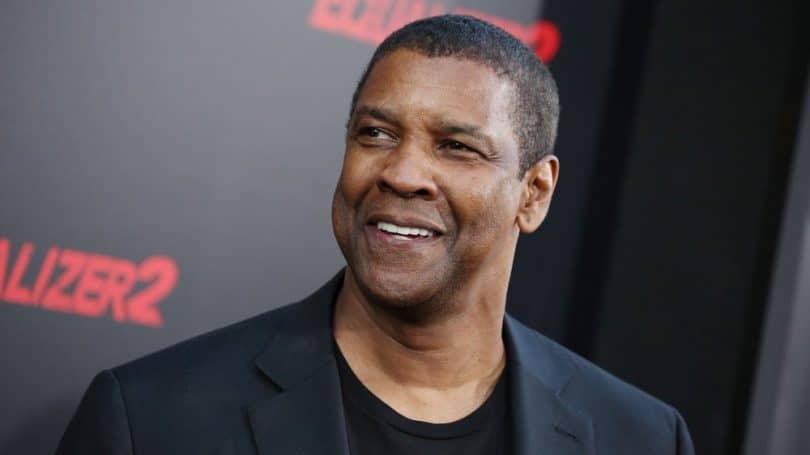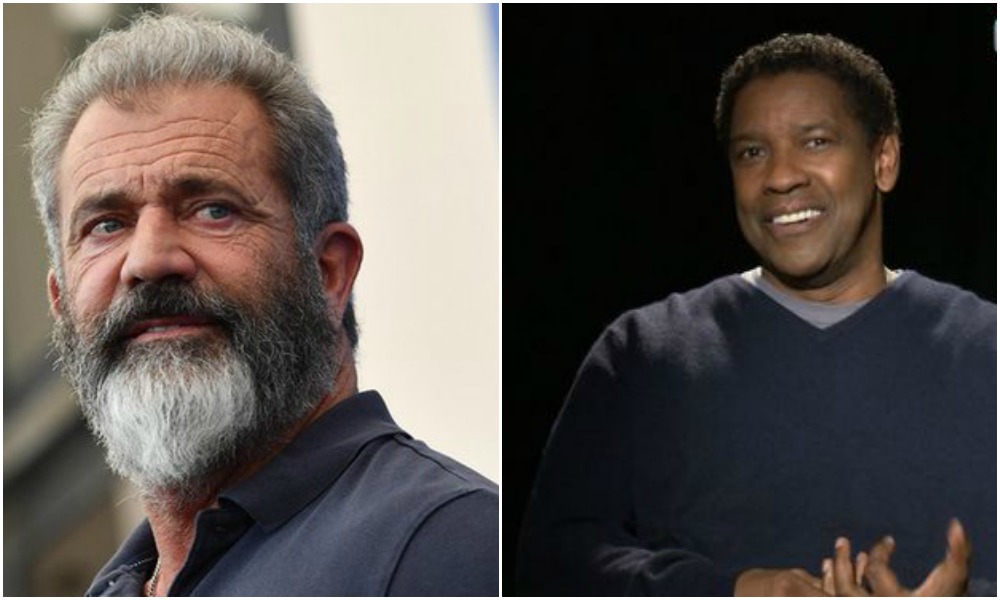Denzel Washington & Mel Gibson Send TERRIFYING Warning About Hollywood: A Call for Change in the Entertainment Industry
In recent years, the entertainment industry has faced increasing scrutiny over its practices, from the rise of cancel culture to the challenges of maintaining creative integrity in an ever-changing media landscape.
Among those raising concerns are two of Hollywood’s most iconic figures: Denzel Washington and Mel Gibson. Both actors, known for their distinctive careers and outspoken personalities, have recently come together to issue a “terrifying warning” about the future of Hollywood.
In their respective statements, they have highlighted a growing sense of fear and uncertainty in the industry, pointing to the influence of politics, social pressures, and a loss of artistic freedom as major concerns.
Their warnings come at a time when Hollywood seems to be at a crossroads, facing challenges that could reshape the industry for years to come.

From the dominance of streaming platforms to the increasing polarization of public discourse, both Washington and Gibson have suggested that the very soul of Hollywood is at risk. But what exactly are these actors warning about, and why should their concerns be taken seriously?
Denzel Washington: A Veteran’s Perspective on the Changing Landscape
Denzel Washington, widely regarded as one of the finest actors of his generation, has been in the public eye for over four decades. Known for his powerful performances in films such as Training Day, Glory, and Fences, Washington has established himself as both a respected actor and a director.
His career has spanned numerous genres, from intense dramas to action-packed thrillers, and he has earned widespread admiration for his commitment to quality filmmaking.
However, in recent interviews, Washington has expressed growing concerns about the direction in which Hollywood is heading. In particular, he has criticized the increasing influence of social and political agendas in the creation of films.
Washington, who has always been a champion of artistic integrity, believes that the industry is now more focused on delivering messages aligned with specific political or social ideologies, rather than prioritizing storytelling or the exploration of complex characters.
“There’s a danger in Hollywood becoming more about pushing certain narratives and less about the art of filmmaking,” Washington warned. “It’s not just about making movies anymore—it’s about making statements. And sometimes, those statements aren’t the ones that need to be made for the sake of good storytelling.”

This statement reflects a growing frustration among some in Hollywood who feel that the focus on political correctness and social justice has begun to overshadow creative freedom.
Washington’s concern is that this trend is not only stifling creativity but also alienating audiences who crave authentic, thought-provoking stories that don’t feel forced or overly politicized.
Additionally, Washington has noted the growing pressure on actors, filmmakers, and creatives to conform to particular viewpoints or risk being canceled.
He expressed concern about the culture of fear that has taken root in Hollywood, where artists may be hesitant to speak their minds or take on certain roles out of fear of backlash from activists, media, or social media users. Washington, known for his candidness, emphasized the importance of freedom of speech and the need to preserve a space for open dialogue in the entertainment industry.
Mel Gibson: A Controversial Voice for Change
Mel Gibson, the Academy Award-winning actor and director behind some of Hollywood’s most memorable films, including Braveheart and The Passion of the Christ, has long been a polarizing figure in the industry.
While his career has been marred by controversy, particularly over past incidents of anti-Semitic remarks and other allegations, Gibson has nevertheless remained a significant voice in Hollywood, and his opinions are often seen as contrarian or unconventional.

In recent years, Gibson has expressed his own concerns about the state of Hollywood, particularly regarding the industry’s increasing politicization and the censorship of certain perspectives.
According to Gibson, Hollywood has become increasingly intolerant of differing viewpoints, with those who do not conform to mainstream political or social narratives being marginalized or excluded. This, he argues, is damaging to the industry and stifles the kind of creativity that has historically made Hollywood a global leader in entertainment.
“What’s happened to Hollywood is a tragedy,” Gibson said. “There used to be a time when we could disagree, we could have different ideas, and that was okay. But now, if you don’t fall in line, if you don’t toe the party line, you’re out. And that’s not good for anyone, especially for art.”
Gibson’s comments reflect a broader sentiment that is gaining traction among some filmmakers and artists, particularly those who feel that the pursuit of political correctness and ideological purity is undermining the spirit of artistic freedom.
Many in Hollywood, including Gibson, argue that the industry has lost its ability to foster meaningful debates and diverse perspectives. Instead of championing different viewpoints, Hollywood has become a place where conformity is demanded, and those who deviate from the prevailing narrative are often silenced or ostracized.
The Changing Face of Hollywood: What’s at Stake?
The warnings from Washington and Gibson come at a time when the landscape of Hollywood is undergoing significant changes. In recent years, the rise of streaming platforms like Netflix, Amazon Prime, and Disney+ has fundamentally altered the way films and television shows are consumed.
Traditional movie theaters have seen a decline in attendance, with many films now premiering directly on streaming services. This shift has led to new opportunities for filmmakers, but it has also introduced new challenges, including an overabundance of content and increasing competition for audiences’ attention.

Moreover, the impact of social media has been profound, allowing for rapid public scrutiny and a constant feedback loop that has forced Hollywood to adjust its messaging.
Celebrities, once afforded a degree of privacy, are now under constant pressure to align with popular causes or risk facing backlash. This environment has led to the rise of cancel culture, where individuals or projects are boycotted, often for reasons unrelated to their actual work.
As Washington and Gibson have pointed out, this environment is creating a climate of fear and self-censorship, which is detrimental to the creative process.
The fear of backlash has led many filmmakers and actors to shy away from certain roles, projects, or themes, worried that their work might be interpreted in a way that invites controversy. As a result, Hollywood risks losing its edge as a place of bold, daring, and original storytelling.
A Call for Artistic Freedom and Open Dialogue
Both Denzel Washington and Mel Gibson have called for a return to the values that once made Hollywood a beacon for creative expression and open dialogue.
They argue that the industry must reclaim its commitment to artistic freedom, where filmmakers are encouraged to take risks and explore new ideas without the fear of being labeled or canceled. Washington, in particular, has emphasized the need for filmmakers to focus on creating compelling stories, rather than prioritizing political agendas or societal pressures.

“What made Hollywood great was that it gave voice to a variety of ideas, no matter how controversial or difficult,” Washington said. “We need to get back to that place where we’re making movies for the sake of making great art.”
Gibson echoed these sentiments, adding that Hollywood must stop allowing fear to dictate the choices of those who create content. He urged the industry to become a place where diverse perspectives are celebrated, and where individuals can express themselves freely without fear of retribution.
Conclusion: A Turning Point for Hollywood?
Denzel Washington and Mel Gibson’s warning about the future of Hollywood is not just a personal reflection on their experiences in the industry; it is a call for broader change.
As Hollywood faces unprecedented challenges in an era of political polarization and digital disruption, the need for creative freedom, artistic integrity, and open dialogue has never been more critical.
The concerns raised by Washington and Gibson should serve as a wake-up call to the industry, urging it to examine how it can evolve while still remaining true to the values that have made it a global powerhouse of creativity and entertainment.
Whether Hollywood will heed these warnings or continue down its current path remains to be seen, but one thing is clear: the future of the industry will depend on its ability to adapt without sacrificing its core principles.


